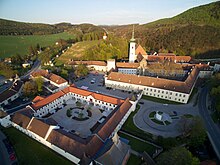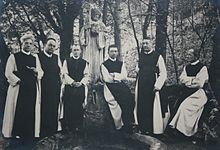Philosophical-Theological College Benedict XVI.

| Philosophical-Theological College Benedict XVI. | |
|---|---|
| founding | January 28, 2007 |
| place | Heiligenkreuz |
| state | Lower Austria |
| country | Austria |
| Rector | Wolfgang Gottfried Buchmüller OCist |
| Students | 295 (2015/2016) |
| Website | www.hochschule-heiligenkreuz.at |
The Philosophical-Theological College Benedict XVI. is a university of the Roman Catholic Church in the Cistercian monastery Stift Heiligenkreuz near Heiligenkreuz in the Vienna Woods .
history
The development of higher theological teaching at Heiligenkreuz Abbey has a long tradition that goes back to the Middle Ages. Since 1802 there has been a church and state recognized institution for the training of priests , an Institutum Theologicum , which was initially set up to meet the needs of the four Lower Austrian Cistercian monasteries Zwettl , Neukloster , Heiligenkreuz and Lilienfeld .
The institute in Heiligenkreuz was unspoken confirmation that the enlightenment general seminars that had emerged from the Josephinian state church had not proven themselves. In the meantime, the (staffed) imperial court found that theological education required heart , soul and understanding , and that future religious would therefore be better off in the monastery.
As in the comparable private schools of the Klosterneuburg , Melk , Lilienfeld, Göttweig and St. Florian monasteries, the number of students in the 19th century remained below 20. Only Cistercians were appointed professors. With the rise of German-speaking theology in the middle of the 19th century, the Heiligenkreuz professors slowly acquired a new profile. Instead of being allowed to read only from state-approved handbooks, they increasingly gained academic independence, researching important areas of religious history , biblical studies and spiritual theology .
Heiligenkreuz professors graduated from universities in Vienna , Tübingen and Rome, and teaching assignments outside of the monastic Institutum Theologicum soon followed . Until the middle of the 20th century, the Heiligenkreuz teaching company retained the profile of the late 19th century almost unchanged, in which scholasticism , medieval studies and the Bible movement were formative.
The audience in Heiligenkreuz increased rapidly when the Institutum Theologicum became known to the Bishop of Regensburg , Rudolf Graber , in the years after the Second Vatican Council. He sent students (especially those who were later called) to Heiligenkreuz in order to have them prepared for the priestly profession within the framework of the religious college, but living in a world seminary, the then "Collegium Rudolphinum". Seminarians from other dioceses and religious orders soon followed . In 1976 , the survey to the Philosophical-Theological University took place. In 2007 the Rudolphinum seminary was placed under the responsibility of the monastery and a commission of Austrian bishops and renamed the Leopoldinum .

On the feast day of St. Thomas Aquinas , January 28, 2007, the college of Pope Benedict XVI. raised to the rank of papal Athenaeum (papal college). On September 9, 2007 Pope Benedict XVI visited the monastery and the Pontifical College named after him and praised them as a “prominent place of study” because of the connection between theology and spirituality.
On January 25, 2014, a fire broke out in the Leopoldinum that was quickly extinguished. The consequences were limited to property damage, no persons were injured.
In October 2017 Abbot Maximilian Heim and University Rector Karl Wallner distanced themselves from the visiting professor Thomas Stark , who taught in Heiligenkreuz , after he had accused Pope Francis of heresy by signing a statement .
University
The Philosophical-Theological College under papal law is primarily dedicated to the training of prospective priests of the Catholic Church. It is currently the only active religious university in Austria and the only university in the Cistercian order. It allows a state and church recognized study of Catholic theology and is also for religious clerics with a seminary linked.
In the 2016 summer semester, 295 students, including 43 Cistercians , 40 from other orders and 75 diocesan candidates for the priesthood, studied at the university , as well as lay people, including women.
Since 2002 , the university has also been involved in church adult education outside the university and supports the St. Justinus Institute in the training of catechists .
Study opportunities
- Studium Generale
- Ten-semester diploma course in Catholic theology : Catholic specialist theology with the degree Magister Theologiae .
- Zwölfsemestriges studies in the Third education for students without Matura or Abitur .
- Licentiate "Spirituality and Evangelism "
- Additional training: theology of the body
- Additional training: body-bond-identity
The Heiligenkreuz University of Applied Sciences does not have the right to award doctorates or habilitation .
Facilities
In terms of organization, the Heiligenkreuz University of Applied Sciences is divided into the following institutes:
- Institute for Philosophy , current director: Marian Christof Gruber O.Cist.
- Institute for Biblical Sciences , current director: Petra Ritter-Müller
- Institute for Church History and Canon Law , current director: Alkuin Volker Schachenmayr O.Cist.
- Institute for Pastoral Theology , Homiletics , Catechetics and Religious Education , current director: Rupert Stadler
- Institute for Moral Theology , current director: Helmut Prader
- Institute for Ethics and Social Sciences , current head: Herbert Pribyl
- Institute for Liturgical Studies and Ecclesiastical Music , current director: Bernhard Vošicky O.Cist.
- Institute for Spiritual Theology and Religious Studies , current director: Wolfgang Buchmüller O.Cist.
- Institute for Dogmatics and Fundamental Theology , current director: Wolfgang Klausnitzer
The PTH Heiligenkreuz also has the European Institute for Cistercian Research , current director: Alkuin Schachenmayr O.Cist., And the European Institute for Philosophy and Religion , current director Hanna-Barbara Gerl-Falkovitz .
Leopoldinum
For candidates for priesthood from the German-speaking dioceses , especially those who are studying in the third educational path , there is the Leopoldinum, a supra-diocesan seminary in the immediate vicinity of Heiligenkreuz Abbey .
Management and faculty
Grand Chancellor (lat. Magnus Cancellarius ) is the current abbot of Heiligenkreuz , since February 10, 2011 Maximilian Heim . The Rector and Vice Rector , as well as a large part of the teaching staff, are also Cistercians from Heiligenkreuz. However, religious priests , friars and women from other religious communities, as well as diocesan priests and lay people are also represented in the teaching body .
The current rector is Wolfgang Gottfried Buchmüller OCist. His predecessor was Karl Wallner OCist, who, after his resignation, managed the university on an interim basis until a successor was appointed.
Well-known lecturers
- Immo Bernhard Eberl
- Peter Egger
- Augustine Fenz OCist
- Rudiger Feulner
- Ferdinand Holböck
- Leopold Janauschek OCist
- Matthäus Kurz OCist
- Wilhelm Anton Neumann OCist
- Abbot Gregor Pöck OCist
- Friedrich Schipper
- Nivard Schlögl OCist
- Walter Schücker OCist
- Abbot Alois Wiesinger OCist
Web links
Individual evidence
- ↑ Fire in the Holy Cross seminary , kath.net , January 25, 2014
- ↑ Heiligenkreuz distances itself from papal criticism. The press of October 20, 2017
- ↑ Course catalog for the summer semester 2016, Heiligenkreuz in February 2016, p. 59
- ↑ management. In: www.hochschule-heiligenkreuz.at. Retrieved June 17, 2020 .
- ↑ Wolfgang Buchmüller new rector of the University of Heiligenkreuz . Article from January 30, 2019, accessed on January 31, 2019.
- ↑ Heiligenkreuz University is looking for a new rector. Retrieved December 6, 2017 .
Coordinates: 48 ° 3 ′ 19 ″ N , 16 ° 7 ′ 49 ″ E

